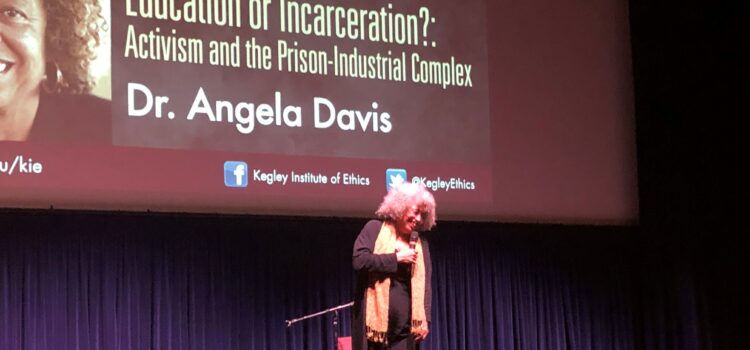
Hundreds of people gathered in Cal State Bakersfield’s Dore Theater to hear activists, academic and author Angela Davis speak for the 33rd Charles W. Kegley Memorial last week.
Davis, who was once a black panther, was on the he FBI’s most wanted list and went into hiding before going on trial in the 1970s. She now travels across the nation giving lectures and is an author of several books.
Hosted by the Kegley Institute of Ethics, Davis’ lecture, called Education or Incarceration?: Activism and the Prison-Industrial Complex, focused on topics leading to a rise in incarceration rates, such as the school-to-prison pipeline, misogyny and racism.
Race and slavery within the punishment system
Capitalism has always relied on racism and continues to rely on racism, according to Davis.
“Slavery was the very basis of the development of capitalism,” she said.
Slavery was the beginning of cheap labor, and after slavery was abolished, it continued through imprisonment, Davis said.
“The punishment system we have today is linked to slavery through the post slavery development of the plantation-based convict-lease system,” Davis said.
The convict-leasing idea came about right after southern states for slavery created more laws to start imprisoning blacks at high rates. The convicts were leased to plantation owners and forced to the work as slaves.
Today, people of minority groups are still facing the same struggles. There are more black men incarcerated now then there were enslaved in 1850, she said.
Rise of incarceration and decline of education
During the de-industrialization period when people were losing their jobs, Davis explained, many people had nowhere to go. There were people who no longer had jobs, housing, access to healthcare and mental care.
“This is precisely the moment when we witness a boom in the prison construction industry, where prisons pop up all over the country,” Davis said.
Now more money is going into the prisons instead of schools, according to the author.
“It is impossible to imagine a solution to the prison crisis without reimagining our whole system of education,” said Davis.
This is how the school-to-prison pipeline idea came about. It’s an idea suggesting schools disproportionately punish students from disadvantaged backgrounds, leading to incarceration.
Now schools don’t look like regular schools. They look like prisons, according to Davis.
“Use school to introduce them to metal detectors and school resource officers. They’re being put on a track that leads them directly to prison.” said, Davis
Misogyny and sexual assault within incarceration
Davis said people need to think deeper about the sexual assault cases that have recently been publicized. Davis said such cases get attention for a short period of time, and they hardly end in the community working to end sexual abuse.
Davis brought up the case of Larry Nassar, the former USA Gymnastics national team doctor and a former osteopathic physician at Michigan State University who was charged for assaulting more than 100 gymnasts. He was sentenced to more than 100 years in prison.
Cases like this serve as a distraction to the problem of sexual assault, she said.
“Imprisonment produces a kind of amnesia — a kind of amnesia with respect to a whole range of social problems,” she said. “Once the perpetrator is sent to prison, we can forget about it.”
However, Davis said women are no longer alone when it comes to fighting for an end to sexual assault violence. Men are starting to stand with women.
Davis is calling men to the table and challenging them to lead the movement to end sxual assault. This starts with men correcting each other even when women are not looking.